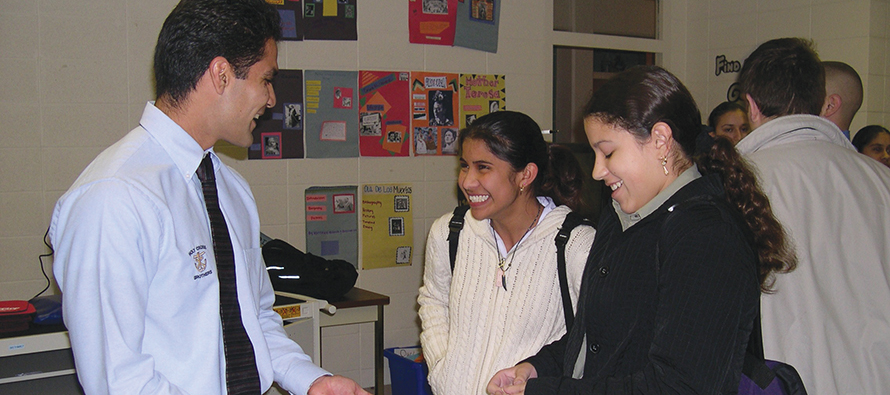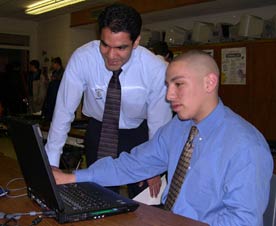
Image: Alonso shares a laugh with students Nayelli Molina (center) and Eligia Rivera (right).
THERE IS NO LOGICAL REASON why I should be a religious brother. Growing up as a migrant field-worker, I had no concept of religious life and no idea what sisters, brothers, and priests did all day.
I grew up Catholic and my parents were regular Sunday churchgoers, but religion never attracted me. Even as a young adult, church bored me, and I couldn’t understand why our parents required our weekly attendance. When going to church became a choice, I skipped it. Even as a college student I avoided church, so of course the idea of becoming a brother was never even a remote possibility.
Yet, three years into college and one ex-girlfriend later, I found myself living in a candidate formation house of the Brothers of Holy Cross. Since then, my life has changed a lot. Now, as a 24-year-old who has made temporary vows, I pray and reflect on my decision, and I realize how right it was. Not one day has passed in which I have doubted it. This is not to say I haven’t faced challenges, because there have been many. Despite them I’m excited to be a Brother of Holy Cross.
Initiating my journey into this life proved difficult, with my own background being the biggest obstacle. As seasonal farmworkers, my family was poor. The instability of poverty helped me realize that education, including college, was key to changing my life. Through hard work, perseverance, and my parents’ support, I succeeded in high school and the university. My parents were delighted at the prospect of having one of their seven children achieve the American dream. I had my own dream of being able to earn enough to get my parents out of the backbreaking fields. There was no greater gift I could return than for my success to free them from the migrant life. This desire and the harsh realities of farmworker life made a religious vocation difficult to choose. As a brother I wouldn’t be able to help my parents financially.
When I told them about my decision to join the brothers, they were confused and upset. It came as a complete surprise to them, as it was for me. That first conversation was painful. Explaining my decision to my friends was also a challenge. Never had I spoken with them about becoming a brother or even acted in a manner that might lead them to believe I had a church vocation. On top of everything else was the fact that I was dating. I found myself trying to explain my decision to my parents, helping my friends understand, and breaking the news to my girlfriend.
Given these circumstances, why did I choose to join the brothers? The answer is simple but profound: community. The brothers were my first experience of Christian community, an experience that triggered my search for religious life. The brothers graciously housed me for six weeks at the beginning of my third year at St. Edward’s University while my apartment complex was still under construction. At the time, I was dating, so I spent little time socializing with them. But once I left their house, I wanted to stay in touch with the brothers. In their communal life, I felt comfortable and enjoyed sharing my life experiences with them. It was this initial community experience that got me thinking about becoming a brother myself.
My own relationship to God was growing at the same time. Migrant work had given me ample opportunity to develop a contemplative side. Working long hours in tedious, mindless labor created a space in which I could assess the current situation. I began asking the question, “What brought these men into community?" Pondering this question made me more willing to share my own story and discover religious life with the men of Holy Cross.
Sharing community with a small group of brothers is what began my journey with Holy Cross, and community is what continues to nourish it. Community life allows me to learn and grow as a person. It’s a risk because brothers don’t choose whom they live with, nor can they dictate to other members what community life should mean.
Our differences of opinion can cause tensions to rise, but with good communication we usually reach a middle ground. In the process, I learn plenty not only about my brothers but also about myself. Self-knowledge is essential to any vocation, be it single, married, or religious. As I come to know myself, I discover who it is God created me to be. Self-knowledge, along with a healthy dose of prayer, allows us to experience a freedom in which choices are not risks but opportunities to learn more about what God has in store for us.
 Risky business
Risky businessTo be honest, joining any religious community in this day and age is a risk. Many sisters, brothers, and priests are concerned about the decline in vocations. Our community, like many others, is always discussing what it means to belong. As religious brothers, we have no clearly defined role or ministry that we must fulfill. Our mission is a question we must revisit. Also, because few people are entering, many of us will be living in small households, a change from the past.
So again, why be a brother in what seems like difficult times? Because these are also very exciting times. Young people entering religious communities now will have a strong influence on decisions concerning the future of both communal life and ministry.
Religious vocations may be lacking in the United States, but not around the world. Meeting young religious from around the world gives me a real sense of hope. At first I thought cultural barriers would prevent us from developing a close fraternal bond. But once we begin to talk about our hopes and fears in our individual situations, we see we have much in common. We all wonder what our ministries will be, what kind of service we will be asked to do, if we will ever see each other again. We share similar struggles and blessings in being young adults who have taken vows. It still amazes me how I’ve come to meet people from Ghana, Bangladesh, India, and Haiti and been able to develop friendships.
As these experiences with international friends multiplied, I began to realize that the most important commonality of all was our relationship with Jesus Christ. The longer I live religious life, the more my love for the Lord intensifies and my fears lessen. Jesus becomes the foundation of every experience because it was the decision to follow the Lord that has brought me so many blessings. God places many opportunities or “risks" in our lives, and with his help they can become life-enriching experiences.
That’s why I encourage anyone interested in religious life to visit a community and just talk with the members. There is no such thing as a risk-free vocation. Every style of life has its own challenges. Even though I faced obstacles early on, I decided to follow God’s call into the brotherhood. I have no regrets because my experiences have helped me grow in faith and self-understanding. I now have a clearer image of the man God wants me to become.
Already I’ve come a long way from the fields where I spent my childhood harvesting crops. I’m excited about the possibilities as I look toward a future spent with my brothers. It’s completely illogical that I should be a brother, and yet completely right.
Tags
Related
- A call to let go: Profile of Brother Christopher Campos Erran, O.S.C.
- God had a plan for me
- He blends new tech and old prayer: Profile of Brother Joseph Anoop, F.S.P.
- From physics lab to friary—and back again
- Better together: Profile of Brother David Relstab, O.S.A.
- The secret’s out: Brotherhood is powerful
- Brothers win the race: Profile of Brother Rafael Vargas, S.D.B.
- God called me to be a brother
- Modern “prodigal son” meets the brothers: Profile of Brother Ray Morris, B.H.
- Brotherhood is right for me Read More
Most Viewed
- Find your spirituality type quiz
- Questions and answers about religious vocations
- Celibacy quiz: Could I be a nun? Could I be a brother? Could I be a priest?
- Resources for older discerners or those with physical and developmental differences
- About Vocation Network and VISION Guide
 Brother Jesús Alonso, C.S.C. belongs to the Congregation of Holy Cross. He currently teaches at San Juan Diego Catholic High School and studies at St. Edward’s University in Austin, Texas.
Brother Jesús Alonso, C.S.C. belongs to the Congregation of Holy Cross. He currently teaches at San Juan Diego Catholic High School and studies at St. Edward’s University in Austin, Texas.